
By Kathy Kelly
Last year, my colleague Sabia Rigby at Voices for Creative Nonviolence in Chicago visited with refugees in “the Calais Jungle,” who were fleeing the Middle East and several African countries for Britain. Thwarted from crossing the English Channel, a large number of people ended up in this refugee camp in Calais, France, from which French authorities eventually evacuated them, burning the camp to the ground.
Sabia did some research on where in the world refugees are being welcomed. One detail astonished her.
In 2016, Yemen, the poorest country in the Arab world, took in 117,000 new refugees and migrants in 2016, and hosts more than 255,000 refugees from Somalia, according to a United Nations spokesman. That is more than the United States, which admitted 84,995 refugees in fiscal year 2016, more than any other year during the Obama Administration.
Yemen is now beginning to host the world’s worst humanitarian crisis, as it receives a flood of Somalis fleeing conflict in the Horn of Africa. Exacerbating the situation, the country is regularly targeted by Saudi and U.S. airstrikes.
After years of U.S. support for Yemeni dictator Ali Adullah Saleh, civil war has wracked the country since 2014. Saudi Arabia, nervous about the outcome, has joined with regional allies to subject Yemen to a punishing barrage of airstrikes, and impose a blockade against the inflow of food and supplies. Saudi Arabia itself is among the region’s cruelest dictatorships, but its efforts have been aided by massive, ongoing weapons shipments from the United States, which has also waged independent airstrikes on the country, killing dozens of civilians, including women and children.
Yemen imports 90 percent of its food. Because of the blockade, food and fuel prices are rising and scarcity is at crisis levels. Pummeled by airstrikes and fighting, facing economic collapse and on the brink of famine, how could this tiny, impoverished country absorb thousands upon thousands of desperate migrants?
UNICEF estimates that more than 460,000 children in Yemen face severe malnutrition, and 3.3 million children and pregnant or lactating women suffer acute malnutrition. More than 10,000 people have been killed, including 1,564 children, and millions have been displaced from their homes. And Yemen’s crisis could get even worse.
Iona Craig, a journalist for the IRIN news, which reports on humanitarian crises, recently wrote of families arriving at a camp southwest of Taiz city only to find “nothing”:
“On arrival, the scores of women and children found nothing. No support from aid agencies. No food. No water. No shelter. The elderly talk of eating the trees to survive, while children beg for water from local farmers. A mother cradles her clearly malnourished baby in her arms.”
On March 16, forty-two Somali people were killed in sustained gunfire from the air as they set forth in a boat attempting to flee Yemen.
“I took cover in the belly of the ship,” survivor Ibrahim Ali Zeyad told The New York Times. “People were falling left and right. Everyone kept screaming, ‘We are Somali! We are Somali!’” But the shooting continued. As of this writing, no one has taken responsibility for the strike, but survivors say they were attacked by a helicopter gunship.
The attacks on Yemen trap both Yemenis and Somalis, causing one U.N. official to warn that the region faces the worst humanitarian crisis since the end of World War II.
Meanwhile, U.S. weapons makers, including General Dynamics, Raytheon, and Lockheed Martin, profit massively from weapon sales to Saudi Arabia. CodePink founder Medea Benjamin has written that Saudi Arabia is the world’s single largest purchaser of U.S. weapons. The Saudis purchase white phosphorus, among other weapons, from the United States and appear to be using it, along with cluster bombs, on civilians in Yemen. Under Obama, the United States reportedly offered the Saudis $115 billion in weapons.
Here in the United States, we must demand a radical departure from policies that exacerbate the tragedy faced by people in Yemen. With so many innocent lives at stake, all U.N. member states must call for an end to the blockade and airstrikes, a silencing of all guns, and a negotiated settlement to the war in Yemen.
U.S. citizens need to contact their elected representatives to demand an end to drone attacks and military “special operations” within Yemen, end all U.S. weapon sales and military aid to Saudi Arabia, and provide compensation to those who suffered losses caused by U.S. attacks.
Voices for Creative Nonviolence is planning a week of fast and action starting April 10 in New York City, to call attention to the situation in Yemen.
As our neighbors around the world flee in desperation across borders or within their own countries, we must educate ourselves about the reality of what our nation’s actions mean to the world’s poor.
Source: The Progressive, Edited by Website Team